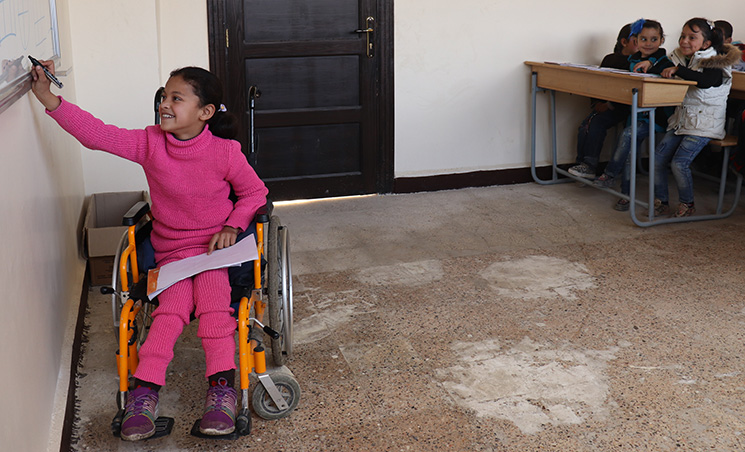
In partnership with UNICEF, The Institute donates $5.00 from each enrolment to the children in the Syria crisis. This money will help to provide a safe education to the children in war-torn Syria.
Last year, UNICEF assisted with the education of 2,239,884 Syrian children affected by war in the region.
Currently, one out of three schools in Syria has been destroyed or rendered unusable due to the crisis. This, along with the lack of essential learning materials in the remaining schools, creates a significant barrier to the education of children in the region.
UNICEF’s aim this year is to assist in providing a formal and safe education for 1.2 million children in Syria. This includes the provision of facilities, school furniture, qualified teachers, rehabilitation, safe learning environments, and learning materials.
We are very privileged to be working with UNICEF towards this goal.
On May 12th, 2017, in Aleppo in the Syrian Arab Republic, Abdullah [NAME CHANGED] (below), 15, studies in a UNICEF-supported accommodation centre for children taking the national Grade 9 and Grade 12 exams. Abdullah felt that he lost everything when his school in southern rural Aleppo closed down due to fighting. He started working on a farm owned by a family to support his parents financially. “Our lives changed when a school reopened at the beginning of this school year, but we faced another difficulty; there were no teachers left to help us study. They all left,” explained Abdullah. Thanks to a retired mathematics teacher who gathered and trained undergraduate university students to help the children prepare for exams, Abdullah and his friends were able to revise lessons and continue their learning. In May, they had to leave their home and set out on the dangerous journey to sit for the Grade 9 exams.

As school children in many parts of the world complete their school year and prepare for holidays and camps, children in Syria have been crossing active conflict lines, desperate to sit for their final school exams. In May and June 2017, almost half a million children took their national exams across Syria. Some 10,689 children came from hard-to-reach and besieged areas. This number was only a third of the 36,017 children who actually registered to take the exams. Many could not get to the exam centres because it was too dangerous or they were not allowed access across checkpoints. These determined children risked their lives, crossing numerous checkpoints where they were questioned by armed men. Many left their families behind and had to walk alone for hours to reach the exam centres. Some of these children have been out of school for a year or more due to the displacement and violence. As a result, they were forced to study at home by themselves or with the help of teachers or with their parents.
UNICEF supported these children by providing bursaries to help cover transportation fees as well as daily living expenses at accommodation shelters close to the exam centres. To help children prepare for exams, UNICEF organised remedial classes and revision sessions and distributed stationery and study materials. UNICEF also provided children with psychosocial support to help them cope with their trauma as a result of the conflict and displacement. Students also received personal hygiene kits to stay clean and fresh during their stay in the accommodation centres.
After more than six years of war in Syria, an estimated 1.75 million children are out of school in Syria. Some children have never seen the inside of a classroom. Education facilities continue to be attacked as violence continues in many parts of the country. One in three schools are damaged, destroyed or used as shelter. Working with its partners, UNICEF is providing educational supplies and textbooks, rehabilitating schools and training teachers to expand learning opportunities. In 2016, UNICEF reached around 3 million children with educational support in Syria. UNICEF has also developed a range of informal educational tools, such as a fast-track curriculum and self-learning materials, targeted to out-of-school children tp help them to catch up with missed years of education. Passing national exams is a gateway to higher education and a better future.
